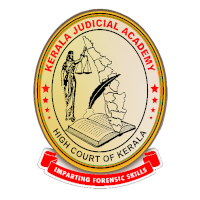Refresher training for judicial officers
Aims and objectives
Members of the District Judiciary must have proper Attitude, Skill and Knowledge to administer Justice. Since the three components are of equal importance, each component is being separately dealt with for imparting training.
1) Attitude -
Inculcation of the right attitude has fundamental prominence in the justice delivery process. A judge probably would be a better dispenser of justice if he is aware of the currents and passions of the time, the developments of technology and the sweep of events. To judge in the real world, a judge must live, think and partake of opinions in the real world. Interaction with other Social scientists, experts in the new technology etc. are essential for a judicial officer. Imbibing true judicial ethics has seminal importance. A Judicial Officer has to have the right perspective and principled mooring. Courses on stress management, health management etc. would improve the working environment. Training must reflect on the fundamental values of the court system, including fairness, access to justice, and the rule of law keeping pace with the intricate ethical and social issues raised by advances in science and technology.
2) Skill
Judicial institutions are increasingly becoming a “career” in which
new appointments are being made from among younger, less experienced
persons, non-lawyers, those with less traditional legal backgrounds; who
have both a need for and hope of continuing professional development.
They have lesser understanding of courtroom practises unlike lawyers and
therefore managing packed court rooms would be an arduous task for
them.
In an adversarial setting, in a courtroom, lawyers representing opposing
parties try to persuade the Judicial Officers. If it fails, they try to
dissuade him/her and at times even attempt to prevent him/her from
deciding cases. Skill required to manage such a setting is vastly
different from managing an ordinary office where there are people who
are primarily expected to work at the beckoning of the manager and in
which management specialists generally excel. Those who are placed in
charge of a court may need to learn management skills appropriate to
their task and herein lies the importance as to who should train a new
entrant and how.
3) Knowledge :
Dispensation of justice requires deep knowledge in law, both substantive
and procedural. Every judgement reflects the acumen in law of the judge
who writes it. Knowledge of precedents in the topic has a vital role in
making the judgement legally correct and judicially sound. It is also
important that the judicial officers are kept abreast with the
development of law in the areas relevant to them. Academy has devised a
participative mode of training for imparting knowledge, where doubts
raised by officers will be discussed thoroughly and relevant inputs will
be given to the officers.
History of refresher training:
District Level Training
The district level training was the first method of continuing judicial education in the state. It was started in 1992 to ensure that all judicial officers continue to nurture the requisite attitude, skill and knowledge during their entire career. The district level training was more participative than passive listening. Questions received from the officers were compiled, circulated among the officers and discussed in the training sessions conducted mainly at the district headquarters.
Regional Training for judicial officers
Refresher courses
In addition to the district level programmes, refresher training programmes were also conducted on the following subjects for:
District Judges
Sub Judges
Munsiff-Magistrates
Special training
Further, every year, the academy used to conduct special training programmes for Principal District Judges and Chief Judicial Magistrates on the evaluation of performance of judicial officers, writing confidential reports and on disciplinary proceedings, Classification, Control and Appeal Rules.
ASK (Attitude, Skill, Knowledge) programmes
Current method of training
Knowledge Enhancement Training (KET) programmes, which focus on intellectual development of the judicial officers. Training programmes are conducted category wise and the method of training is socratic and the focus of such programmes is on participative learning.
Skill Enhancement Training (SET) programmes, which focus on imparting specific judicial skills to the judicial officers, through interaction and lectures.
Special training programmes, on relevant specialised subjects to the judicial officers and other stakeholders.
